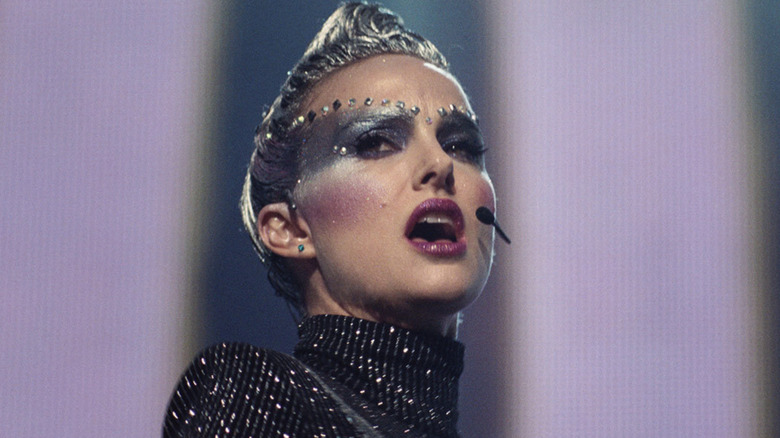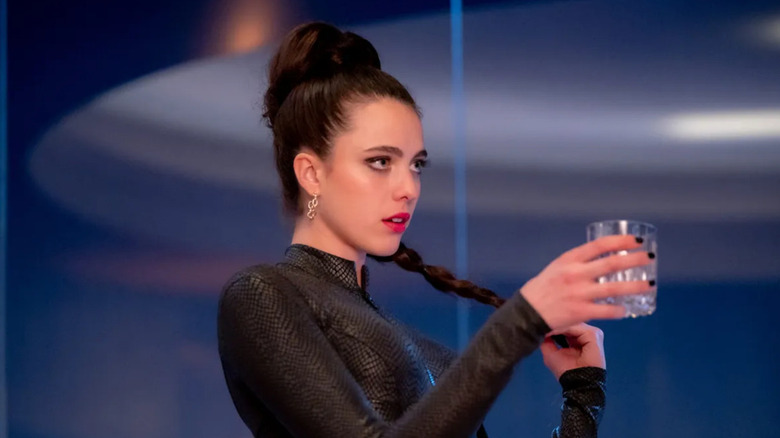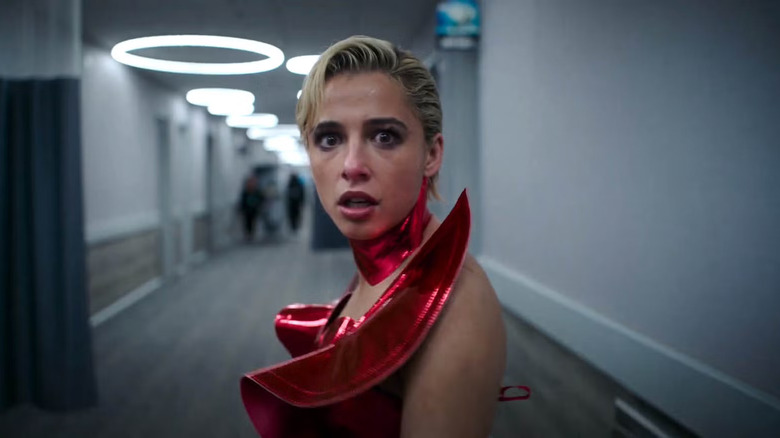One Of The Best Thrillers You've Never Seen Is Fueling 2024's Wildest Horror Movies
This article contains spoilers for "Vox Lux," "Trap," "Smile 2," and "The Substance."
The marriage of popular music and subversive cinema is hardly new. Whether it's peppy musical numbers in "After the Thin Man," the music of Miles Davis in "Elevator to the Gallows," or the needle drops in many of the films of Martin Scorsese and Quentin Tarantino, the combination of catchy melodies and infections rhythms with harrowing drama and the onset of violence has been a cinematic peanut butter and jelly for a long time now, almost as long as the dawn of movies themselves. Yet something very intriguing has been happening in American culture ever since the turn of the century. Where cinema has taken advantage of its malleability of genre and tone to explore the well-rounded totality of the human condition, pop music has undergone a curious shift.
The frivolity, ennui and devil-may-care attitude that so pervaded pop music for the bulk of the 1980s and 1990s changed with the events of September 11th and the subsequent onslaught of recessions, the rise of social media, mass shootings, and other national tragedies that only seem to increase in regularity. Pop will never die, of course; there will always be a market and an audience for catchy music and the personalities who make it. Yet pop stars have seemingly come under more scrutiny than before, not less. If they're not humble and anonymous ghostwriters, they're some of the biggest celebrities in the world, with literal legions of fans ready to go to war for them at the drop of a tweet.
It's the relationship — often a disparity — between the pop star as a human being and what their music and their celebrity persona represent that's become increasingly bizarre, as these people have to balance being treated with godlike reverence while perhaps not feeling truly seen. "Vox Lux," the second feature from director Brady Corbet — himself a child actor in his early teens, getting to experience showbiz from a young age like so many pop stars do — attempted to tackle these themes head-on. Although it wasn't a massive hit when it was released at the end of 2018, it nonetheless gained a decent critical appraisal and has become a bit of a cult favorite. Perhaps that's why several of 2024's wildest horror movies share a lot of DNA with Corbet's film, with "Trap," "Smile 2," "The Substance," and even "Longlegs" owing a debt to Corbet's tale of a quintessential 21st-century pop star.
Trap and Vox Lux: the pop star as snake charmer
In "Vox Lux," a Staten Island girl named Celeste (played as a teen by Raffey Cassidy) begins her unlikely journey to pop stardom thanks to a classmate who commits a mass shooting in her 8th grade classroom. Although Celeste ends up shot and injured by the boy, Cullen (Logan Riley Bruner), her wound may not have been fatal due to the fact that she attempted to calm Cullen down during his attack, offering to listen to his problems and to pray with him. Although Cullen ultimately completes his attack, it's possible that neither killing himself nor allowing Celeste to live was part of his original plan. Celeste goes on to become a pop star via a song that she co-writes that was inspired by this event.
M. Night Shyamalan's "Trap" was very reminiscent of this in the way that pop star Lady Raven (Saleka Night Shyamalan) manages to subdue and outwit the vicious serial killer known as the Butcher, aka Cooper Abbott (Josh Hartnett). Shyamalan's film leans into the combination of pop gloss and resident evil, positioning Cooper as a snake in the grass who's trying to escape the a sting operation set up for him at Lady Raven's concert. Rather than being used as a pawn in a larger game, Lady Raven subsequently becomes a Final Girl to Cooper's killer, using her intelligence and resourcefulness (including her own fanbase) to make sure Cooper isn't able to escape the authorities for good.
Smile 2, The Substance, and Vox Lux: my own worst enemy
In the second chapter of "Vox Lux," we're introduced to an adult Celeste, played by Natalie Portman. Like so many celebrities whose lives are under the close watch of the media from a young age, Celeste is rife with personal issues, including rampant substance abuse and frequent mental breakdowns. Adding some meta hardship to her struggles is her teenage daughter Albertine, who is also played by Cassidy. Thus, Celeste's destructive, violent behavior in the presence of her daughter can also be viewed as her adult self being in contention with and subtly tormented by her younger self.
This subtext is made into literal body horror text in Coralie Fargeat's "The Substance," which concerns Elizabeth Sparkle (Demi Moore) taking a mysterious drug that literally births a younger, more "perfect" persona named Sue (Margaret Qualley). Although "The Substance" is about a television celebrity and not a pop star, Fargeat's film pulses with an electro-pop beat thanks to the score by Raffertie, and the issues of age, beauty, fame, and celebrity it brings up are in the same conversation as "Vox Lux."
What's even more pointed than the cultural and patriarchal commentary in both films is the fact that both Celeste and Elizabeth are self-destructive, an issue that is absolutely shared by Skye Riley (Naomi Scott) in "Smile 2." All three characters are forced to reckon with themselves, but where Celeste and Elizabeth are given physical representations of this duality, Skye has to deal with her literal sense of reality broken by the Smile Demon which attaches itself to her. This demon, as seen in the first "Smile," most often takes the guise of the person that torments its victim the most.In Skye's case, that's herself. Her past issues with substance abuse and inadvertently causing the death of her boyfriend eventually eat her alive.
How Vox Lux, Trap, and Smile 2 bring authenticity to their pop horror fables
There's one key element in particular which makes "Trap," "Smile 2," and "Vox Lux" all able to tell their pop star horror fables with utter credibility: the songs themselves. Movies and TV shows about fictional bands and musicians are about a dime a dozen, and sure, just about every one involves original music being written for these fictional stars to perform. However, it's common that either some of that original music isn't actually as good as the story needs it to be, or that the songs are great but too disparate to feel like they're credibly coming from the same band or artist.
"Vox Lux" circumvented this problem by hiring the same person to write all of Celeste's songs — a woman who's actually a mega pop star herself: Sia. It's a choice that gives Celeste a perfect musical continuity despite her being played by two different actresses, and gives the movie as a whole a particular signature sound. In this way, it's similar to the approach taken by Brian De Palma in "Phantom of the Paradise": hiring legit hit songwriter and performer Paul Williams to handle the entire soundtrack rather than just one song or one character.
For "Smile 2," director Parker Finn made sure to cast a star who has the chops to genuinely be a popstar herself in Naomi Scott. (The actress even co-wrote several of Skye's songs.) Finn also involved another popstar, Tate McRae, in the writing of the track "Grieved You," giving Skye a modern sound that feels perfectly of the moment. For "Trap," Shyamalan didn't have to look far to find an actual pop singer to play his popstar; his own daughter, Saleka, has been steadily building her music career since 2020.
Smile 2, Longlegs, and Vox Lux: pop apocalypse
What's intriguing about the way "Vox Lux" has influenced these horror movies of 2024 is that "Vox Lux" is not a horror movie per se. However, it can be one in retrospect, depending on your personal interpretation of the film's narrative and its final fairy tale "twist." As Willem Dafoe's unnamed Narrator explains during the movie's close, Celeste allegedly told her sister Eleanor (Stacy Martin) that, upon being shot by Cullen, she made a deal with the Devil for her life, inferring that her subsequent stardom has all been diabolically influenced. This eerie grace note lends "Vox Lux" a powerful chill, implying that the celebrity popstar machine is somehow rotten at its core and is only perpetuating evil rather than dispelling it.
It's an idea that ironically allows the film to have something in common with both "Phantom" and this year's "Longlegs." In that latter movie, Nicolas Cage portrays the titular serial killer, a being who once used to be a man named Dale Kobble. Director Osgood Perkins has detailed a backstory for Longlegs that's implied in the movie itself: he was once a glam rock musician who sold his soul to the Devil. Since then, he's committed a series of deliberate murders that only seem random at first, because they're really part of an occult plan of invocation.
Celeste's stardom in "Vox Lux" can be seen as the Devil's plan, especially as one of her music videos seemingly inspires a terrorist attack in Croatia. This concept of evil unleashed via a popstar is the crux of the finale of "Smile 2," in which Skye is possessed by the trauma demon while performing live on stage in front of millions of fans — her death presumably allowing every person witnessing her concert to now become infected with the demon.
At a basic level, these films have fun playing around with the iconography of pop music and celebrity, implying something which many of us implicitly understand: that real human beings with messy lives lie behind the gloss of apparent perfection that celebrity shows us. On a deeper level, however, these movies infer that pop stars, and pop culture by extension, can be a damning distraction, with the sheen of stardom allowing Evil to slip by unnoticed until it's too late. If the horror genre is made up of cautionary tales, then these films double as warnings. To paraphrase a certain book: beware of false prophets, even (or especially) if it's yourself.
"Smile 2" and "The Substance" are in theaters now. "Vox Lux" and "Trap" are available to rent or buy on streaming platforms.




